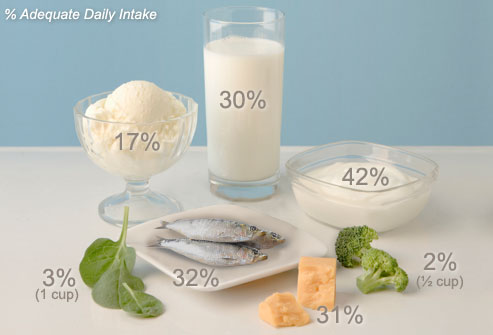Protect Your Bones – Why You Need Calcium and How to Get Enough

You can take charge of your bone health. Learn why calcium can help, and how you can get enough calcium after weight loss surgery.
Bone Loss Is Irreversible
Obesity is a serious disease that’s tough to overcome, but there is at least one positive thing about obesity: it is reversible. Hard as it may be, you can lose weight and get your health back. After losing weight, you may have lower blood pressure, sugar, and cholesterol levels, less joint pain, and more energy than you’ve had in years.
That’s not true with your bones. Your bone density increases from birth until your mid or late 20s. After your skeleton is mature and you reach peak bone mass, your bone density decreases for the rest of your life. Your job is to keep the decreases as slow as possible to preserve your bone mass.
Bone Health is for Everyone
A lot of people think that osteoporosis is something that only frail, older women need to worry about. That’s just not true. Men and women of all ages need to think about bone health after weight loss surgery.
- Younger weight loss surgery patients are still building bone mass. If you get weight loss surgery before your late 20s, you may never reach your highest possible peak bone mass.
- Middle aged adults need to protect bone mass so you’re not at high risk for fractures when you get older.
- Women around menopause are already losing bone density quickly. If you don’t protect yourself after weight loss surgery, you could quickly develop osteoporosis even if you had healthy bones a few years ago.
- Men have higher bone density than women, but you can still get osteoporosis. Your risk increases as you get older, and you don’t want weight loss surgery to increase your risk.
Calcium in Your Body
Most of the calcium in your body is in your bones, but 1 percent of the calcium is in your blood and other tissues. Calcium is necessary for vital processes, like muscle contraction, hormone secretion, blood pressure regulation, and sending nerve impulses. Calcium levels in your blood are very tightly monitored. If blood levels of calcium drop, you need more calcium in your blood. Ideally, your body uses calcium from your diet to bring calcium levels back to normal.
This works well when you get enough calcium in your diet. If you don’t, your bones suffer. That’s because your body pulls calcium from your bones to put in your blood when there’s no dietary calcium available. Your bones slowly get weaker every time this happens.
Why Bone Loss Is a Problem After Weight Loss Surgery
It’s harder to get enough calcium from your diet when you lose weight fast. That’s why you're at high risk for osteoporosis after weight loss surgery.
- You’re eating less food overall.
- You’re cutting out liquid calories, such as from milk.
- You’re cutting way back on junk foods that have calcium, such as pizza, fortified but sugary breakfast cereal, and ice cream.
You may also be absorbing less calcium from your diet after weight loss surgery.
- Calcium absorption drops after gastric bypass.
- Vitamin D absorption, which is necessary for calcium absorption, drops after gastric bypass.
- Vitamin D absorption drops if you eat a very low-fat diet, which is likely after weight loss surgery.
Get Three Servings of High-Calcium Foods Each Day
The following foods are good sources of calcium. They also have protein, making them great choices for your weight loss surgery diet.
- 1 cup of non-fat yogurt or Greek yogurt.
- ½ cup of non-fat cottage cheese.
- 1 ounce of reduced-fat cheese.
- 3 ounces of canned salmon.
- 3 ounces of canned mackerel.
- ½ cup of tofu.
Calcium at Breakfast, Lunch, and Dinner
Aim for one serving of a high-calcium food at breakfast, lunch, and dinner. These are some ideas for dishes with a good amount of calcium.
- Oatmeal cottage cheese pancakes.
- Baked tomatoes with low-fat feta cheese.
- Broccoli with melted low-fat cheddar cheese and crushed cashews.
- Salmon salad made with Greek yogurt instead of mayo and wrapped in a lettuce leaf.
- Chili made with tofu instead of beef.
- A fish wrap with canned mackerel, basil, tomato slices, and spinach or arugula on a small, high-fiber tortilla.
Other Ways to Protect Your Bone Health
Take the dietary supplements that your surgical center recommends. Those will probably include a daily multivitamin supplement and one or two daily doses of calcium. You may also be told to take vitamin D. Other nutrients affect your bone health, so make sure to eat the healthy foods on your meal plan. Regular exercise is another great way to keep your bones strong.
Osteoporosis puts you at risk for devastating fractures, and you may not even know you have it until you break a bone. You can lose bone mass after weight loss surgery, but you can protect yourself with a healthy diet and exercise plan. In particular, getting enough calcium on a daily basis can keep you healthy.
My dietitian said that I should begin taking 1000 mg of calcium citrate daily since it is recommended following my bariatric procedure. The pills should be split into 2 500 mg doses.




JustWatchMe 7,117
Posted
Good reminder. I never thought about osteoporosis because I was always obese and brittle bones seemed like something only skinny older people got. But one day I will be a skinny older person too. And what I do now can prevent problems later. Thanks!
Share this comment
Link to comment
Share on other sites